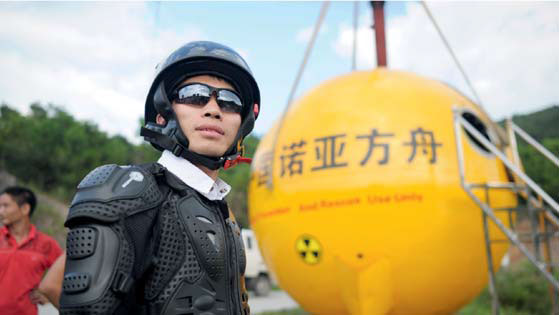China's survivalist revival
Updated: 2015-09-18 07:43
By David Dawson(China Daily Europe)
|
|||||||||||
|
Businessman Yang Zongfu spent 1.5 million yuan building a survival pod named Noah's Ark in Yiwu, Zhejiang province, in 2012. Provided to China Daily |
Some in the newly prosperous middle class have caught survival fever
One commenter asks whether radiation from the sun could turn the Ebola virus into a zombie plague. He is dismissed and jeered in the comments, as a discussion on how to reduce the weight of a "bug out" bag picks up steam. Elsewhere, users debate the merits of bows and arrows, how to treat bullet wounds, and gas mask maintenance.
Welcome to the Survival Fanatics Baidu Tieba forum.
Home to an eclectic mix of about 60,000 members who share an interest in preparing for disaster, the forum was founded in 2008. According to Wang (a pseudonym), a moderator of the group, members come from a diverse range of backgrounds.
"Most are middle class, and they are basically survivalists because they want to maintain their living conditions and social status (in the event of a disaster)," Wang says. "The middle class is the backbone of the survivalist movement as their material and spiritual enjoyment is much higher than those of the worker and peasant classes," Wang says, highlighting the fact that the middle class has more to protect.
When Deng Xiaoping rolled out the reform and opening-up policy in the '70s and proclaimed that China should "let some people get rich first", a middle class was inevitable. So with the proliferation in material possessions in a country that has weathered a tumultuous history, it is perhaps unsurprising that such rapid growth would also promote a certain sense of insecurity among those who have accumulated a moderate level of material well-being.
Thus, the modern survivalist movement was born.
Defining exactly what constitutes a survivalist is a difficult task, as they come in many forms. In the most general sense, it is a need for preparedness, though Wang points out that in some cases this can be as simple as "focusing on their lives and property in their daily lives and safety, such as making sure they adhere strictly to road rules, using fire and electricity safely, educating their children with safety knowledge, and preparing self-help or emergency items for the elderly".
He says that those who carry it a bit further might "install burglar alarms in their homes, give capsaicin spray to family members - particularly females - and carry portable self-help tools or certain drugs provided they are not against the law."
Those who take it further prepare survival kits and invest in improving their skills, such as swimming, camping, repair and medical care.
Today's Top News
Opinion: Opportunity knocks for EU and China over next five years
Yuan rises for 7th day in a row, highest level since August
Reforms spark legal brain drain
EU officials postpone visit to Turkey after attacks in Ankara
Documents of Nanjing Massacre inscribed on Memory of World Register
Xi congratulates Kim on WPK anniversary
CPC expels media exec over UK 'green card'
Chinese students' print-like English handwriting stirs controversy
Hot Topics
Lunar probe , China growth forecasts, Emission rules get tougher, China seen through 'colored lens', International board,
Editor's Picks

|

|

|

|

|

|







